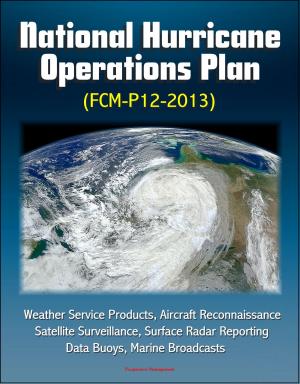21st Century U.S. Military Manuals: U.S. Coast Guard (USCG) Marine Safety Manual Volume One, Marine Safety Program, Environmental Response, Commercial Vessel Safety, Boating Safety
Nonfiction, Sports, Water Sports, Boating, Reference & Language, Transportation, Ships & Shipbuilding| Author: | Progressive Management | ISBN: | 9781466031791 |
| Publisher: | Progressive Management | Publication: | February 21, 2012 |
| Imprint: | Smashwords Edition | Language: | English |
| Author: | Progressive Management |
| ISBN: | 9781466031791 |
| Publisher: | Progressive Management |
| Publication: | February 21, 2012 |
| Imprint: | Smashwords Edition |
| Language: | English |
Part of our value-added professional format series of U.S. military manuals, this U.S. Coast Guard (USCG) manual covers the basics of the marine safety program including boating safety, commercial vessel safety, environmental response, and more.
In the early 1800's, Congress was reluctant to address "marine safety" issues with regard to the steamboat industry. Only after a long series of marine incidents, involving heavy losses of life and property, did Congress enact legislation and create a federal organization, the Steamboat Inspection Service, to preserve and protect the public from preventable marine incidents. The preservation of life in the aftermath of a marine incident was carried out by federal search and rescue forces; the protection aspect (before-the-fact) was handled by federal agencies involved with maritime law enforcement and aids to navigation. The Coast Guard's current marine safety programs still retain the overall philosophical objectives of the historical preservation and protection programs. As a result of myriad statues and regulations affecting the marine environment and the marine industry, several distinct programs concerned with marine safety and related issues have evolved: Commercial Vessel Safety (CVS), Port and Environmental Safety (PES), Marine Environmental Response (MER), Waterways Management (WWM), Recreational Boating Safety (RBS), and Bridge Administration (BA).
The MSM is the primary policy and procedural statement for the marine safety programs of the Coast Guard. Published for the use of all Coast Guard marine safety and industry personnel, it prescribes the essential functions which must be performed to attain the overall objectives of the CVS and PES/MER/WWM Programs and certain investigative functions of the RBS Program. The MSM should be used as a guide for consistent and uniform administration of marine safety activities, without undue hampering of independent action and judgment by marine safety personnel.
As a bonus, this reproduction includes the Marine Corps Manual, the basic publication of the United States Marine Corps issued by the Commandant of the Marine Corps and approved by the Secretary of the Navy - sold separately for $7.99. It is a regulatory publication for the Department of the Navy as defined in U.S. Navy Regulations. The Marine Corps Manual is designed primarily for use by Marine Corps commanders and their staffs, Navy officers exercising command over Marines, the staff of the Commandant of the Marine Corps, and the staffs of the bureaus and offices of the Navy Department. Contents: Chapter 1 - General Administration And Management * Chapter 2 - Manpower * Chapter 3 - Operations And Readiness * Chapter 4 - Logistics
Part of our value-added professional format series of U.S. military manuals, this U.S. Coast Guard (USCG) manual covers the basics of the marine safety program including boating safety, commercial vessel safety, environmental response, and more.
In the early 1800's, Congress was reluctant to address "marine safety" issues with regard to the steamboat industry. Only after a long series of marine incidents, involving heavy losses of life and property, did Congress enact legislation and create a federal organization, the Steamboat Inspection Service, to preserve and protect the public from preventable marine incidents. The preservation of life in the aftermath of a marine incident was carried out by federal search and rescue forces; the protection aspect (before-the-fact) was handled by federal agencies involved with maritime law enforcement and aids to navigation. The Coast Guard's current marine safety programs still retain the overall philosophical objectives of the historical preservation and protection programs. As a result of myriad statues and regulations affecting the marine environment and the marine industry, several distinct programs concerned with marine safety and related issues have evolved: Commercial Vessel Safety (CVS), Port and Environmental Safety (PES), Marine Environmental Response (MER), Waterways Management (WWM), Recreational Boating Safety (RBS), and Bridge Administration (BA).
The MSM is the primary policy and procedural statement for the marine safety programs of the Coast Guard. Published for the use of all Coast Guard marine safety and industry personnel, it prescribes the essential functions which must be performed to attain the overall objectives of the CVS and PES/MER/WWM Programs and certain investigative functions of the RBS Program. The MSM should be used as a guide for consistent and uniform administration of marine safety activities, without undue hampering of independent action and judgment by marine safety personnel.
As a bonus, this reproduction includes the Marine Corps Manual, the basic publication of the United States Marine Corps issued by the Commandant of the Marine Corps and approved by the Secretary of the Navy - sold separately for $7.99. It is a regulatory publication for the Department of the Navy as defined in U.S. Navy Regulations. The Marine Corps Manual is designed primarily for use by Marine Corps commanders and their staffs, Navy officers exercising command over Marines, the staff of the Commandant of the Marine Corps, and the staffs of the bureaus and offices of the Navy Department. Contents: Chapter 1 - General Administration And Management * Chapter 2 - Manpower * Chapter 3 - Operations And Readiness * Chapter 4 - Logistics















